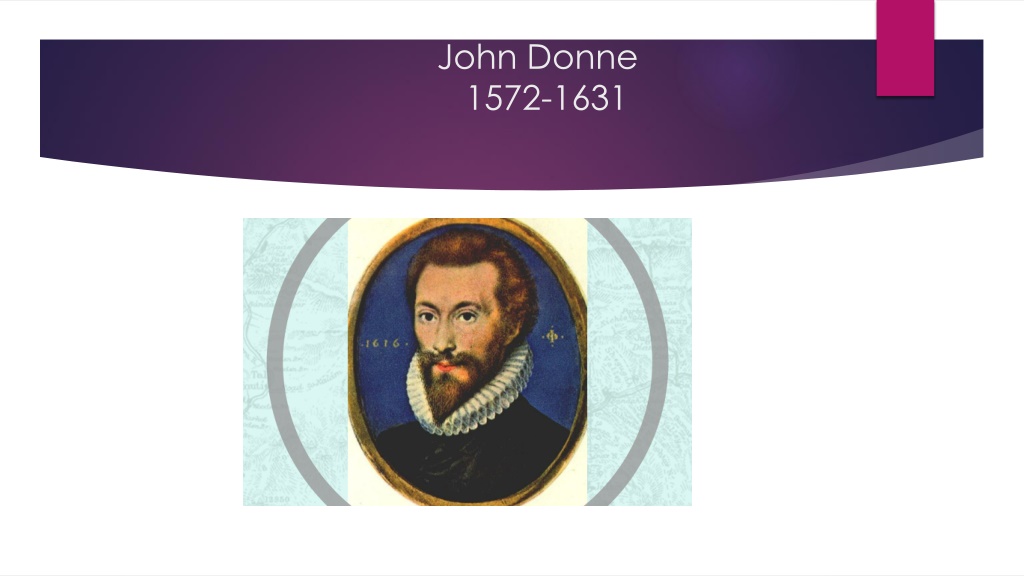
John Donne: Metaphysical Poet and Preacher
John Donne, a prominent Jacobean poet and preacher, was born in London in 1572. He converted to Anglicanism, became a chief exponent of the Metaphysical School of poetry, and faced challenges, including imprisonment. Despite personal struggles, he rose to prominence as a preacher and served as the Dean of St. Paul's Cathedral in London. Learn about his life, works, and legacy.
Download Presentation

Please find below an Image/Link to download the presentation.
The content on the website is provided AS IS for your information and personal use only. It may not be sold, licensed, or shared on other websites without obtaining consent from the author. If you encounter any issues during the download, it is possible that the publisher has removed the file from their server.
You are allowed to download the files provided on this website for personal or commercial use, subject to the condition that they are used lawfully. All files are the property of their respective owners.
The content on the website is provided AS IS for your information and personal use only. It may not be sold, licensed, or shared on other websites without obtaining consent from the author.
E N D
Presentation Transcript
John Donne 1572-1631
John Donne was an outstanding Jacobean poet, preacher and a major representative of the metaphysical poets of the period. He was born in London in 1572 to a prominent Roman Catholic family but converted to Anglicanism during the 1590s. He was the eldest son of a London iron merchant.
1.Donne was a chief exponent of Metaphysical School of poetry. 2. By religion Donne was a Roman Catholic. 3. The Roman Catholic religion was illegal in England at that time. 4. Interestingly, John Donne shared exactly the similar name as his father. 5. His father John Donne was a rich ironmonger and a well-respected person. 6. His mother Elizabeth Heywood was the daughter of John Heywood, a famous playwright and a grand-daughter of Thomas More, the author of Utopia.
. At the age of 11 he entered the University of Oxford, where he studied for three years. According to some accounts he spent the next three years at the University of Cambridge but took no degree at either of the universities. He joined Lincoln's Inn, London to study law in 1591.
He became secretary to Sir Thomas Egerton, Lord Keeper of the Great Seal in 1598. He was dismissed from Egerton's service when he secretly married Ann More, Egerton's niece, he also suffered brief imprisonment. For 14 years after that he ate the bitter bread of dependence.
In his mood of despair he yet wrote wittily to his wife, John Donne, Ann Donne, Un- done . Years of wandering and poverty followed, until Sir George More forgave the young lovers and made an allowance to his daughter.
Instead of enjoying his new comforts Donne grew more ascetic and intellectual in his tastes. When his wife died her allowance ceased and Donne was left with 7 children in extreme poverty.
Then he became a preacher, rose rapidly by sheer intellectual force and genius and in 4 years was the greatest of English preachers and Dean of St. Paul's Cathedral in London. He died on March 31, 1631 in London, England at 59 years of age. The cause of death is thought to have been stomach cancer. He was buried in Saint Paul's Cathedral. A memorial statue in honor of his death can be seen on show in the present day building in London.
His poetry is generally divided into two types- love lyrics and religious verse.
His works include sonnets, love poetry, religious poems, Latin translations, epigrams, elegies, songs, satires and sermons.
He wrote cynical verse about inconstancy such as 'Go and catch a falling star' and I can love both fair and brown ; poems about true love such as The Good Morrow ; neo-platonic lyrics on the mystical union of lovers' souls and bodies such as 'Air and Angels and 'The Ecstasy ; brilliant satires; hymns and holy sonnets depicting his own spiritual struggle such as 'Hymn to God the Father'.
Whatever the subject, Donne's poems reveal the same characteristics that typified the work of the metaphysical poets. In his poetry we have excessive intellectualism, dramatic note, obscurity, ratiocination, paradox, wit, unification of sensibility, and above all the use of conceits. --
He has also written remarkable love lyrics. A significant feature of Donne's poetry is his emphatic revolt from the smooth sweetness of the Elizabethan verse. His poems are entirely different from the Elizabethan love lyrics.
He oscillates between physical love and holy love, between cynicism and faith in love. His love songs are unconventional and original both in form and content. There is a blend of sensibility and wit, of joy and scorn, of beauty and repulsion.
Donne has been admired by modern critics like Ezra Pound, W.B. Yeats and T.S. Eliot.
John Donne coined several well-known phrases. Both no man is an island and for whom the bell tolls (the latter of which Ernest Hemingway used as the title for one of his novels) originate in one of John Donne s meditations, Meditation XVII.
His well-known poems are: The Good Morrow, The Canonization , Go and Catch a Falling Star , A Valediction Forbidding Mourning , Death be Not Proud , For Whom the Bell Tolls , Sunne Rising , Ecstasy, Flea , The Apparition
